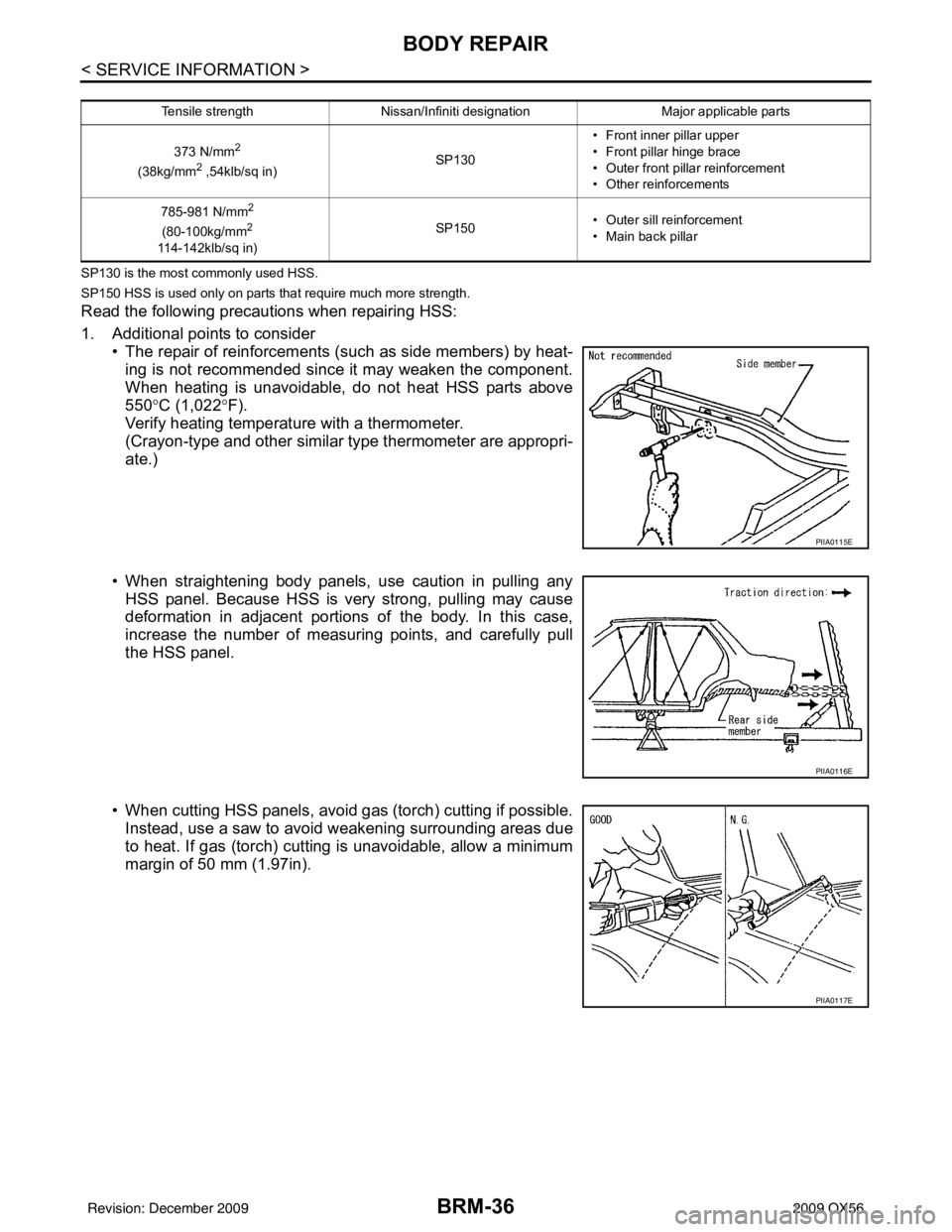heating INFINITI QX56 2009 Factory Service Manual
[x] Cancel search | Manufacturer: INFINITI, Model Year: 2009, Model line: QX56, Model: INFINITI QX56 2009Pages: 4171, PDF Size: 84.65 MB
Page 632 of 4171

BRM-36
< SERVICE INFORMATION >
BODY REPAIR
SP130 is the most commonly used HSS.
SP150 HSS is used only on parts that require much more strength.
Read the following precautions when repairing HSS:
1. Additional points to consider• The repair of reinforcements (such as side members) by heat-ing is not recommended since it may weaken the component.
When heating is unavoidable, do not heat HSS parts above
550° C (1,022° F).
Verify heating temperature with a thermometer.
(Crayon-type and other similar type thermometer are appropri-
ate.)
• When straightening body panels, use caution in pulling any HSS panel. Because HSS is very strong, pulling may cause
deformation in adjacent portions of the body. In this case,
increase the number of measuring points, and carefully pull
the HSS panel.
• When cutting HSS panels, avoid gas (torch) cutting if possible. Instead, use a saw to avoid weakening surrounding areas due
to heat. If gas (torch) cutting is unavoidable, allow a minimum
margin of 50 mm (1.97in).
Tensile strength Nissan/Infiniti designation Major applicable parts
373 N/mm
2
(38kg/mm2 ,54klb/sq in) SP130• Front inner pillar upper
• Front pillar hinge brace
• Outer front pillar reinforcement
• Other reinforcements
785-981 N/mm
2
(80-100kg/mm2
114-142klb/sq in) SP150
• Outer sill reinforcement
• Main back pillar
PIIA0115E
PIIA0116E
PIIA0117E
Revision: December 20092009 QX56
Page 745 of 4171

CO-1
ENGINE
C
DE
F
G H
I
J
K L
M
SECTION CO
A
CO
N
O P
CONTENTS
ENGINE COOLING SYSTEM
PRECAUTION ....... ........................................2
PRECAUTIONS .............................................. .....2
Precaution for Supplemental Restraint System
(SRS) "AIR BAG" and "SEAT BELT PRE-TEN-
SIONER" ............................................................. ......
2
Precaution Necessary for Steering Wheel Rota-
tion After Battery Disconnect ............................... ......
2
Precaution for Liquid Gasket .....................................3
PREPARATION ............................................4
PREPARATION .............................................. .....4
Special Service Tool ........................................... ......4
Commercial Service Tool ..........................................5
FUNCTION DIAGNOSIS ...............................6
COOLING SYSTEM ....................................... .....6
Cooling Circuit ..................................................... ......6
Schematic .................................................................7
OVERHEATING CAUSE ANALYSIS ..................8
Troubleshooting Chart ...............................................8
ON-VEHICLE MAINTENA NCE ....................10
ENGINE COOLANT ....................................... ....10
Inspection ............................................................ ....10
Changing Engine Coolant .......................................11
RADIATOR ........................................................14
Checking Radiator ............................................... ....14
ON-VEHICLE REPAIR .................................15
RADIATOR ....... .................................................15
Exploded View ..................................................... ....15
Removal and Installation .........................................15
ENGINE COOLING FAN ...................................18
Exploded View .........................................................18
Removal and Installation (Crankshaft Driven
Type) .......................................................................
18
Removal and Installation (Motor Driven Type) ........19
WATER PUMP ..................................................20
Exploded View .........................................................20
Removal and Installation .........................................20
THERMOSTAT AND WATER PIPING ..............22
Exploded View .........................................................22
Removal and Installation .........................................22
SERVICE DATA AND SPECIFICATIONS
(SDS) ............... .......................................... ...
24
SERVICE DATA AND SPECIFICATIONS
(SDS) .................................................................
24
Standard and Limit .............................................. ....24
Revision: December 20092009 QX56
Page 752 of 4171

CO-8
< FUNCTION DIAGNOSIS >
OVERHEATING CAUSE ANALYSIS
OVERHEATING CAUSE ANALYSIS
Troubleshooting ChartINFOID:0000000003771283
SymptomCheck items
Cooling sys-
tem parts
malfunction Poor heat transfer
Water pump malfunction Worn or loose drive belt
—
Thermostat stuck closed Coolant circulation
Damaged fins
Dust contamination or pa-
per clogging
Physical damage
Clogged radiator cooling
tube Excess foreign material
(rust, dirt, sand, etc.)
Water cut valve malfunction Excess foreign material
(rust, dirt, sand, etc.), phys-
ical damage
Reduced air flow Cooling fan does not oper-
ate
Fan assembly —
High resistance to fan rota-
tion
Damaged fan blades
Damaged radiator shroud —Radiator shroud —
Improper engine coolant
mixture ratio —
Engine coolant viscosity —
Poor engine coolant quality —Engine coolant density —
Insufficient engine coolant Engine coolant leaksCooling hose
Loose clamp
Cracked hose
Water pump Poor sealing
Radiator cap Loose
Poor sealing
Radiator O-ring for da
mage, deterio-
ration or improper fitting
Cracked radiator tank
Cracked radiator core
Reservoir tank Cracked reservoir tank
Overflowing reservoir tank Exhaust gas leaks into cool-
ing system Cylinder head deterioration
Cylinder head gasket deteri-
oration
Revision: December 20092009 QX56
Page 753 of 4171

OVERHEATING CAUSE ANALYSISCO-9
< FUNCTION DIAGNOSIS >
C
DE
F
G H
I
J
K L
M A
CO
NP
O
Except cool-
ing system
parts mal-
function —
Overload on engine Abusive driving
High engine rpm under no
load
Driving in low gear for ex-
tended time
Driving at extremely high
speed
Powertrain system malfunc-
tion
—
Installed improper size
wheels and tires
Dragging brakes
Improper ignition timing
Blocked or restricted air
flow Blocked radiator grille Installed car brassiere
—
Mud contamination or paper
clogging
Blocked bumper
Blocked radiator
Blocked condenser
Blocked air flow
Installed large fog lamp
Symptom
Check items
Revision: December 20092009 QX56
Page 767 of 4171

THERMOSTAT AND WATER PIPINGCO-23
< ON-VEHICLE REPAIR >
C
DE
F
G H
I
J
K L
M A
CO
NP
O
CAUTION:
Perform when the engine is cold.
2. Disconnect the water cut valve connector.
3. Disconnect the water hoses from the water cut valve.
4. Remove the water cut valve.
INSPECTION AFTER REMOVAL
• Place a thread so that it is caught in the valve of the thermostat.
Immerse fully in a container filled with water. Heat while stirring.
• The valve opening temperature is the temperature at which the valve opens and falls from the thread.
• Continue heating. Check the full-open lift amount.
• After checking the full-open lift amount, lower the water tempera- ture and check the valve closing temperature.
Standard values:
INSTALLATION
Installation is in the reverse order of removal.
Installation of Thermostat
• Install the thermostat with the whole circumference of each flange
part fit securely inside the rubber ring as shown.
• Install the thermostat with the jiggle valve facing upwards.
Installation of Water Outlet Pipe and Heater Pipe
First apply a neutral detergent to the O- rings, then quickly insert the insertion parts of the water outlet pipe and
heater pipe into the installation holes.
INSPECTION AFTER INSTALLATION
• Check for leaks of the engine coolant. Refer to CO-10, "Inspection".
• Start and warm up the engine. Visually check for leaks of the engine coolant.
SLC252B
Thermostat
Valve opening temperature 80 - 84°C (176 - 183 ° F)
Full-open lift amount More than 10 mm/ 95°C (0.39 in/ 203° F)
Valve closing temperature 77°C (171 °F) or higher
KBIA2502E
Revision: December 20092009 QX56
Page 773 of 4171

REAR WINDOW DEFOGGER SYSTEMDEF-5
< FUNCTION DIAGNOSIS >
C
DE
F
G H
I
J
K
M A
B
DEF
N
O P
Component Parts LocationINFOID:0000000003776331
Component DescriptionINFOID:0000000003776332
ALLIA0314ZZ
1. A. Steering column assembly B. BCM M18, M20 (view with instru-
ment panel removed) 2. A/C and AV switch assembly (rear
window defogger switch) M98 3. A. Rear window defogger ground
connector D604
B. Rear window defogger connector
D406
4. IPDM E/R E120, E122, E124 5. Do or mirror (door mirror defogger)
LH D4, RH D107
BCM • Operates the rear window defogger with the operation of rear window defogger switch.
• Performs the timer control of rear window defogger.
Rear window defogger relay • Operates the rear window defogger and the door mirror defogger with the control signal from
BCM.
A/C and AV switch assembly
(rear window defogger switch) • The rear window defogger switch is turned ON.
• Turns the indicator lamp ON when detecting the operation of rear window defogger.
Rear window defogger • Heats the heating wire with the power supply from the rear window defogger relay to prevent
the rear window from fogging up.
Door mirror defogger • Heats the heating wire with the power supply from the heated mirror relay to prevent the door
mirror from fogging up.
Revision: December 20092009 QX56
Page 779 of 4171

REAR WINDOW DEFOGGER POWER SUPPLY AND GROUND CIRCUIT
DEF-11
< COMPONENT DIAGNOSIS >
C
D E
F
G H
I
J
K
M A
B
DEF
N
O P
REAR WINDOW DEFOGGER POWER SUPPLY AND GROUND CIRCUIT
DescriptionINFOID:0000000003776342
Heats the heating wire with the power supply from the rear window defogger relay to prevent the rear window
from fogging up.
Component Function CheckINFOID:0000000003776343
1. CHECK REAR WINDOW DEFOGGER
Check that the heating wire of rear window defogger is heated when turning the rear window defogger switch
ON.
Is the inspection result normal?
YES >> Rear window defogger is OK.
NO >> Refer to DEF-11, "
Diagnosis Procedure".
Diagnosis ProcedureINFOID:0000000003776344
1. CHECK POWER SUPPLY CIRCUIT
1. Turn ignition switch ON.
2. Check voltage between rear window defogger connector and ground.
Is the inspection result normal?
YES >> GO TO 2
NO >> GO TO 3
2. CHECK GROUND CIRCUIT
1. Turn ignition switch OFF.
2. Disconnect rear window defogger.
3. Check continuity between rear window defogger connector and ground.
Is the inspection result normal?
YES >> GO TO 4
NO >> Repair or replace harness.
3. CHECK HARNESS CONTINUITY
Te r m i n a l s Condition of rear window
defogger switch Voltage (V)
(Approx.)
(+)
(–)
Rear window
defogger
connector Te r m i n a l
D406 1 Ground ON Battery voltage
OFF 0
ALLIA0177ZZ
Rear window defogger connector Terminal
GroundContinuity
D604 2 Yes
ALLIA0178ZZ
Revision: December 20092009 QX56
Page 781 of 4171

DOOR MIRROR DEFOGGER LHDEF-13
< COMPONENT DIAGNOSIS >
C
DE
F
G H
I
J
K
M A
B
DEF
N
O P
DOOR MIRROR DEFOGGER LH
DescriptionINFOID:0000000003776346
Heats the heating wire with the power supply from t he rear window defogger relay to prevent the door mirror
from fogging up.
Component Function CheckINFOID:0000000003776347
1. CHECK DOOR MIRROR DEFOGGER LH
Check that heating wire of door mirror defogger LH is heated when turning the rear window defogger switch
ON.
Is the inspection result normal?
YES >> Door mirror defogger is OK.
NO >> Refer to DEF-13, "
Diagnosis Procedure".
Diagnosis ProcedureINFOID:0000000003776348
1. CHECK POWER SUPPLY
Check if the following fuse in the IPDM E/R is blown.
Is the inspection result normal?
YES >> GO TO 2
NO >> If fuse is blown, be sure to eliminate cause of malfunction before installing new fuse.
2. CHECK DOOR MIRROR DEFOGGER POWER SUPPLY CIRCUIT
Check voltage between IPDM E/R connector and ground.
Is the inspection result normal?
YES >> GO TO 3
NO >> Replace IPDM E/R. Refer to PCS-34, "
Removal and Installation of IPDM E/R".
3. CHECK DOOR MIRROR DEFOGGER POWER SUPPLY CIRCUIT 2
1. Turn ignition switch OFF.
2. Disconnect door mirror LH.
3. Turn ignition switch ON.
4. Check voltage between door mirror LH connector and ground.
Is the inspection result normal?
YES >> GO TO 4
COMPONENT PARTS AMPEREFUSE NO.
IPDM E/R 15A43
ConnectorTe r m i n a l
ConditionVoltage (V)
(Approx.)
(+) (-)
E120 23 Ground Rear window defogger
switch ON
Battery voltage
Rear window defogger
switch OFF 0
LIIA2049E
ConnectorTe r m i n a l
ConditionVoltage (V)
(Approx.)
(+) (-)
D4 10 Ground Rear window defogger
switch ON
Battery voltage
Rear window defogger
switch OFF 0
LIIA1456E
Revision: December 20092009 QX56
Page 783 of 4171

DOOR MIRROR DEFOGGER RHDEF-15
< COMPONENT DIAGNOSIS >
C
DE
F
G H
I
J
K
M A
B
DEF
N
O P
DOOR MIRROR DEFOGGER RH
DescriptionINFOID:0000000003776350
Heats the heating wire with the power supply from t he rear window defogger relay to prevent the door mirror
from fogging up.
Component Function CheckINFOID:0000000003776351
1.CHECK DOOR MIRROR DEFOGGER RH
Check that the heating wire of door mirror defogger RH is heated when turning the rear window defogger
switch ON.
Is the inspection result normal?
YES >> Door mirror defogger RH is OK.
NO >> Refer to DEF-15, "
Diagnosis Procedure".
Diagnosis ProcedureINFOID:0000000003776352
1. CHECK POWER SUPPLY
Check if the following fuse in the IPDM E/R is blown.
Is the inspection result normal?
YES >> GO TO 2
NO >> If fuse is blown, be sure to eliminate cause of malfunction before installing new fuse.
2. CHECK DOOR MIRROR DEFOGGER POWER SUPPLY CIRCUIT
Check voltage between IPDM E/R connector and ground.
Is the inspection result normal?
YES >> GO TO 3
NO >> Replace IPDM E/R. Refer to PCS-34, "
Removal and Installation of IPDM E/R".
3. CHECK DOOR MIRROR DEFOGGER POWER SUPPLY CIRCUIT 2
1. Turn ignition switch OFF.
2. Disconnect door mirror RH.
3. Turn ignition switch ON.
4. Check voltage between door mirror RH connector and ground.
Is the inspection result normal?
YES >> GO TO 4
COMPONENT PARTS AMPEREFUSE NO.
IPDM E/R 15A43
ConnectorTe r m i n a l
ConditionVoltage (V)
(Approx.)
(+) (-)
E120 23 Ground Rear window defogger
switch ON
Battery voltage
Rear window defogger
switch OFF 0
LIIA2049E
ConnectorTe r m i n a l
ConditionVoltage (V)
(Approx.)
(+) (-)
D107 10 Ground Rear window defogger
switch ON
Battery voltage
Rear window defogger
switch OFF 0
LIIA1456E
Revision: December 20092009 QX56
Page 1332 of 4171

EC-5
C
DE
F
G H
I
J
K L
M
EC A
N
O P
On Board Diagnosis Logic ..................................
..
295
P1211 TCS CONTROL UNIT ...........................296
Description .......................................................... ..296
On Board Diagnosis Logic ....................................296
DTC Confirmation Procedure ................................296
Diagnosis Procedure .............................................296
P1212 TCS COMMUNICATION LINE ..............297
Description .......................................................... ..297
On Board Diagnosis Logic ....................................297
DTC Confirmation Procedure ................................297
Diagnosis Procedure .............................................297
P1217 ENGINE OVER TEMPERATURE .........298
On Board Diagnosis Logic .................................. ..298
Overall Function Check .........................................298
Diagnosis Procedure .............................................299
Main 13 Causes of Overheating ............................300
P1225 TP SENSOR ..........................................302
Component Description ....................................... ..302
On Board Diagnosis Logic ....................................302
DTC Confirmation Procedure ................................302
Diagnosis Procedure .............................................302
P1226 TP SENSOR ..........................................304
Component Description ....................................... ..304
On Board Diagnosis Logic ....................................304
DTC Confirmation Procedure ................................304
Diagnosis Procedure .............................................304
P1421 COLD START CONTROL .....................306
Description .......................................................... ..306
On Board Diagnosis Logic ....................................306
DTC Confirmation Procedure ................................306
Diagnosis Procedure .............................................306
P1550 BATTERY CURRENT SENSOR ...........308
Component Description ....................................... ..308
On Board Diagnosis Logic ....................................308
DTC Confirmation Procedure ................................308
Diagnosis Procedure .............................................308
Component Inspection ..........................................310
P1551, P1552 BATTERY CURRENT SEN-
SOR ..................................................................
312
Component Description ....................................... ..312
On Board Diagnosis Logic ....................................312
DTC Confirmation Procedure ................................312
Diagnosis Procedure .............................................312
Component Inspection ..........................................314
P1553 BATTERY CURRENT SENSOR ...........316
Component Description ....................................... ..316
On Board Diagnosis Logic ....................................316
DTC Confirmation Procedure ................................316
Diagnosis Procedure .............................................316
Component Inspection ..........................................318
P1554 BATTERY CURRENT SENSOR ...........320
Component Description ....................................... ..320
On Board Diagnosis Logic .....................................320
Overall Function Check .........................................320
Diagnosis Procedure .............................................321
Component Inspection ...........................................322
P1564 ICC STEERING SWITCH .....................324
Component Description .........................................324
On Board Diagnosis Logic .....................................324
DTC Confirmation Procedure ................................324
Diagnosis Procedure .............................................324
Component Inspection ...........................................326
P1564 ASCD STEERING SWITCH .................328
Component Description .........................................328
On Board Diagnosis Logic .....................................328
DTC Confirmation Procedure ................................328
Diagnosis Procedure .............................................328
Component Inspection ...........................................330
P1568 ICC FUNCTION ....................................332
On Board Diagnosis Logic .....................................332
DTC Confirmation Procedure ................................332
Diagnosis Procedure .............................................332
P1572 ICC BRAKE SWITCH ..........................333
Component Description .........................................333
On Board Diagnosis Logic .....................................333
DTC Confirmation Procedure ................................333
Diagnosis Procedure .............................................334
Component Inspection ...........................................337
P1572 ASCD BRAKE SWITCH ......................339
Component Description .........................................339
On Board Diagnosis Logic .....................................339
DTC Confirmation Procedure ................................339
Diagnosis Procedure .............................................340
Component Inspection ...........................................343
P1574 ICC VEHICLE SPEED SENSOR .........344
Component Description .........................................344
On Board Diagnosis Logic .....................................344
DTC Confirmation Procedure ................................344
Diagnosis Procedure .............................................344
P1574 ASCD VEHICLE SPEED SENSOR .....346
Component Description .........................................346
On Board Diagnosis Logic .....................................346
DTC Confirmation Procedure ................................346
Diagnosis Procedure .............................................346
P1805 BRAKE SWITCH .................................348
Description .............................................................348
On Board Diagnosis Logic .....................................348
DTC Confirmation Procedure ................................348
Diagnosis Procedure .............................................348
Component Inspection ...........................................350
P2100, P2103 THROTTLE CONTROL MO-
TOR RELAY ....................................................
351
Component Description .........................................351
Revision: December 20092009 QX56